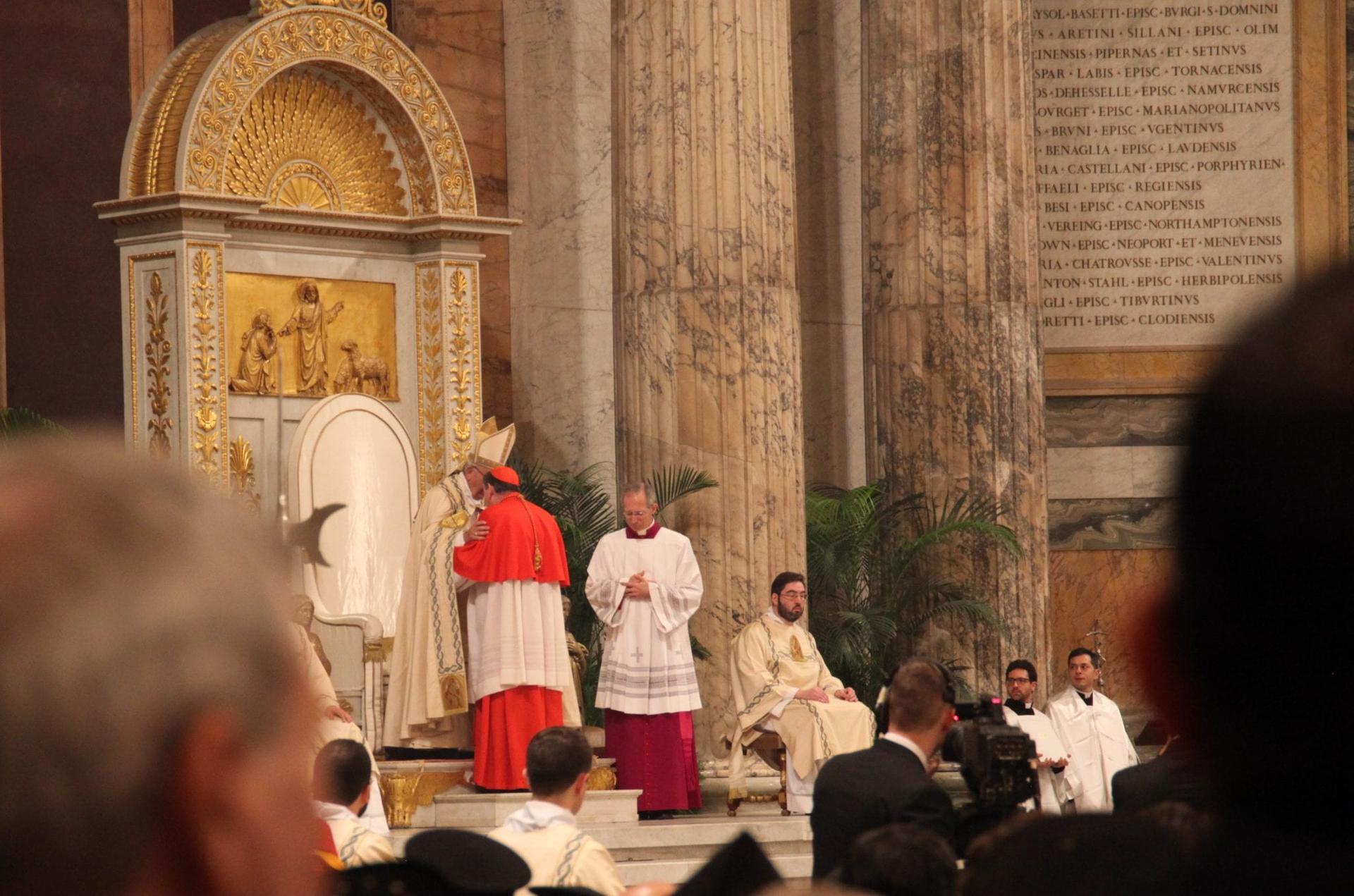ROME – Representatives from a variety of Christian communities in Rome gathered in the Basilica of St. Paul Outside the Walls Thursday, in an ecumenical vespers service where Pope Francis said that despite differences they all belong to the same family due to the redeeming sacrament of baptism.
“Even when differences tear us apart, we recognize that we belong to the people of the redeemed, to the same family of brothers and sisters loved by the only Father,” he said.
The pope celebrated the vespers honoring the conversion of St. Paul in conclusion of the annual Week of Prayer for Christian Unity, which took place Jan. 20-25.
This year Francis honored the 500th anniversary of the Reformation by celebrating the liturgy with a representative of the Lutheran Church and with German hymns.
Among those attending the prayer service were the Burundian Anglican Bishop Bernard Ntahoturi and many representatives from the Methodist, Evangelical and Orthodox Churches in Rome.
The celebration honors the Paul the apostle, who is buried in the Basilica, a one-time persecutor converted to Christianity who spent his life writing to and visiting the different, and often conflicting, new cradles of Christianity around the known world.
Starting with the book of Exodus’s description of siblings Moses and Mary praising the Lord before the Red Sea and thanking him for delivering them from slavery in Egypt through those very waters, Francis explained how the passage illustrates God’s salvation through Baptism.
“All of us Christians have passed through the waters of Baptism, and the grace of the Sacrament has destroyed our enemies, sin and death,” the pope said. “We share in the fundamental experience: the grace of God, his powerful mercy in saving us. And precisely because he had this victory in us, together we can sing its praise.”
In the same way as Moses and Mary, the pope continued, St. Paul experienced God’s grace when he was thrown off his horse and led into life as a Christian.
“The grace of God pushed him also to search for communion with other Christians, from the beginning, first in Damascus and then in Jerusalem. This is our experience of believers. As we grow in our spiritual life, we better understand that grace reaches us with others and must be shared with others,” Francis said.
In light of this, faithful understand that they “do not sing alone,” but rather they are joined by a community that shares in the same praise. The pope added that in the past century Christians have “finally understood” that they are together singing on the shores of the Red Sea.
“When we state that we recognize the baptism of Christians from other traditions, we confess that they have also received the forgiveness of the Lord and his grace that works though them. And we welcome their profession as an authentic expression of praise for God’s work,” he said.
Francis did not forget to mention the “Ecumenism of Blood” that unites Christians throughout the world and the many faithful who fall prey to violence, persecution or human traffickers.
“How many brothers today face persecution in the name of Jesus! When their blood is shed, even if they belong to different confessions, they become together witnesses of faith, martyrs, joined in the bond of baptismal mercy,” Francis said.
By drawing on their common memory, Christians may “support one another” and face every challenge and threat with “bravery and hope,” the pope concluded, before thanking the many congregations and Christian denominations present.
Closing remarks were made by Swiss Cardinal Kurt Koch, who serves as President of the Pontifical Council for the Promotion of Christian Unity. Drawing on the experience of St. Paul and the Second Vatican Council, the cardinal stated that, “conversion is the deepest soul of every ecumenical effort,” and prayed that such efforts lead to a reconstruction of Christian Unity.
“We continue to live in separate Churches and Communities, demonstrating that we have wounded and wound the single Body of Christ and damaging the credibility of the proclamation of the Gospel in the modern world,” Koch said. “The conversion of St. Paul the Apostle exhorts us to understand that we also are in need of conversion.”
The climate at the event was jovial, with members from the various congregations greeting each other and sharing impressions at the end.
“I always participate!” said Father Francisco Alberca of the Italian Episcopal Church. “Pope Francis has always drawn us in because he is open to dialogue and willing to really change the narrative on ecumenism.”
The Reverend Tim Macquiban, Representative of the Methodist Church in Rome and director of the Methodist Ecumenical Office, said that he was pleased because “every year there is something new,” referring to the inclusion of Protestant clergy in the celebration, and expressed the hope that a Methodist might concelebrate with the pope in the future.
“This joint celebration is a symbol of the recognition that we are one and that we are getting closer in doctrine,” he told Crux. “It’s really tremendous to be here and be with Pope Francis!”
In a brief interview following the event, Koch spoke to Crux about the significance of the “ecumenism of Blood” for all Christians, saying “all Christians who are persecuted are not persecuted because they are Catholic, Protestant or Lutheran,” but because they are a witness to the Gospel.
“[Anti –Christian persecution] is the most important issue in ecumenism,” he added, “because the martyrs have found unity in heaven and can help us find it here on earth.”











